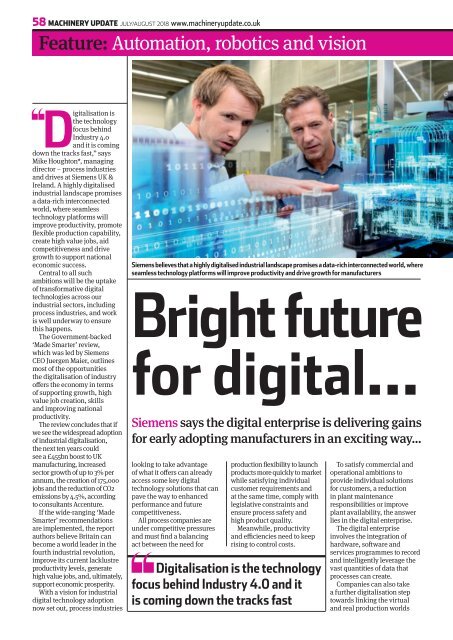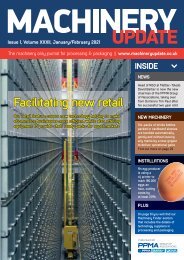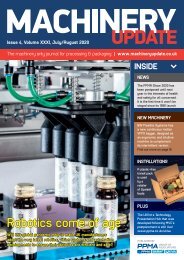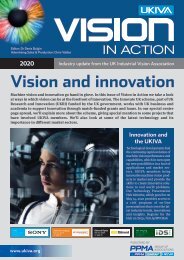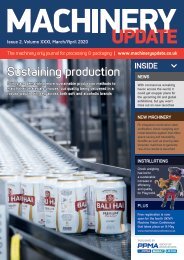July August hi-res with ads
You also want an ePaper? Increase the reach of your titles
YUMPU automatically turns print PDFs into web optimized ePapers that Google loves.
58 MACHINERY UPDATE JULY/AUGUST 2018 www.mac<strong>hi</strong>neryupdate.co.uk<br />
Feature: Automation, robotics and vision<br />
Digitalisation is<br />
the technology<br />
focus be<strong>hi</strong>nd<br />
Industry 4.0<br />
and it is coming<br />
down the tracks fast,” says<br />
Mike Houghton*, managing<br />
director – process industries<br />
and drives at Siemens UK &<br />
Ireland. A <strong>hi</strong>ghly digitalised<br />
industrial landscape promises<br />
a data-rich interconnected<br />
world, where seamless<br />
technology platforms will<br />
improve productivity, promote<br />
flexible production capability,<br />
create <strong>hi</strong>gh value jobs, aid<br />
competitiveness and drive<br />
growth to support national<br />
economic success.<br />
Central to all such<br />
ambitions will be the uptake<br />
of transformative digital<br />
technologies across our<br />
industrial sectors, including<br />
process industries, and work<br />
is well underway to ensure<br />
t<strong>hi</strong>s happens.<br />
The Government-backed<br />
‘Made Smarter’ review,<br />
w<strong>hi</strong>ch was led by Siemens<br />
CEO Juergen Maier, outlines<br />
most of the opportunities<br />
the digitalisation of industry<br />
offers the economy in terms<br />
of supporting growth, <strong>hi</strong>gh<br />
value job creation, skills<br />
and improving national<br />
productivity.<br />
The review concludes that if<br />
we see the widespread adoption<br />
of industrial digitalisation,<br />
the next ten years could<br />
see a £455bn boost to UK<br />
manufacturing, increased<br />
sector growth of up to 3% per<br />
annum, the creation of 175,000<br />
jobs and the reduction of CO2<br />
emissions by 4.5%, according<br />
to consultants Accenture.<br />
If the wide-ranging ‘Made<br />
Smarter’ recommendations<br />
are implemented, the report<br />
authors believe Britain can<br />
become a world leader in the<br />
fourth industrial revolution,<br />
improve its current lacklustre<br />
productivity levels, generate<br />
<strong>hi</strong>gh value jobs, and, ultimately,<br />
support economic prosperity.<br />
With a vision for industrial<br />
digital technology adoption<br />
now set out, process industries<br />
Siemens believes that a <strong>hi</strong>ghly digitalised industrial landscape promises a data-rich interconnected world, where<br />
seamless technology platforms will improve productivity and drive growth for manufacturers<br />
Bright future<br />
for digital…<br />
Siemens says the digital enterprise is delivering gains<br />
for early adopting manufacturers in an exciting way...<br />
looking to take advantage<br />
of what it offers can already<br />
access some key digital<br />
technology solutions that can<br />
pave the way to enhanced<br />
performance and future<br />
competitiveness.<br />
All process companies are<br />
under competitive p<strong>res</strong>su<strong>res</strong><br />
and must find a balancing<br />
act between the need for<br />
production flexibility to launch<br />
products more quickly to market<br />
w<strong>hi</strong>le satisfying individual<br />
customer requirements and<br />
at the same time, comply <strong>with</strong><br />
legislative constraints and<br />
ensure process safety and<br />
<strong>hi</strong>gh product quality.<br />
Meanw<strong>hi</strong>le, productivity<br />
and efficiencies need to keep<br />
rising to control costs.<br />
Digitalisation is the technology<br />
focus be<strong>hi</strong>nd Industry 4.0 and it<br />
is coming down the tracks fast<br />
To satisfy commercial and<br />
operational ambitions to<br />
provide individual solutions<br />
for customers, a reduction<br />
in plant maintenance<br />
<strong>res</strong>ponsibilities or improve<br />
plant availability, the answer<br />
lies in the digital enterprise.<br />
The digital enterprise<br />
involves the integration of<br />
hardware, software and<br />
services programmes to record<br />
and intelligently leverage the<br />
vast quantities of data that<br />
processes can create.<br />
Companies can also take<br />
a further digitalisation step<br />
towards linking the virtual<br />
and real production worlds


